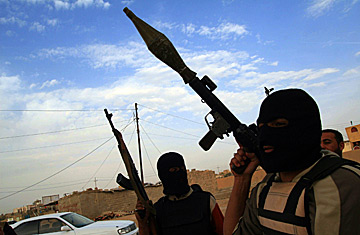
Iraqi Shi'ite fighters wave their weapons as they celebrate an end to clashes with Iraqi government troops in the southern city of Basra on March 30, 2008.
One day after fighting between the Iraqi government and Shi'ite militias escalated alarmingly, anti-American militia chieftain Moqtada al-Sadr extended an olive branch. On Sunday Sadr told members of his militia to stop appearing in the streets with weapons and to halt their attacks on government institutions.
It appeared on Monday that militants had heeded Sadr's call in Basra. Reuters reported that armed fighters were no longer in the streets and that the city was calm. In Baghdad the situation was less clear. The government lifted a city-wide curfew in all but a few militia strongholds, signaling that fears of truly disastrous violence had begun to subside. But at least some militants either had not yet received or were choosing to ignore Sadr's directive. Monday morning rockets or mortars once again slammed into the U.S. and Iraqi headquarters in central Baghdad. In what has become a routine since such attacks began last weekend, American soldiers and contractors caught outdoors sought cover in concrete bunkers.
Sources in Basra tell TIME that there has been a large-scale retreat of the Mahdi Army in the oil-rich Iraqi port city because of low morale and because ammunition is low due to the closure of the Iranian border. TIME has not yet been able to confirm those reports with U.S., Mahdi Army or Iraqi government authorities.
The fighting and the rhetoric had ramped up Saturday. As U.S. warplanes targeted militiamen in Basra, Iraqi Prime Minister Nouri al-Maliki said that the government's enemies in the south were "worse than al-Qaeda." A Sadrist spokesman then retorted that fighters should not surrender their weapons except to a government committed to ejecting U.S. troops from Iraq. But on Sunday, Sadr, in a statement released through his office in the holy city of Najaf, called on his followers to stop making "armed appearances." He said he hoped to avoid more bloodshed. This week's violence has claimed hundreds of lives in Basra, Baghdad and elsewhere.
On television, an Iraqi government spokesman hailed the announcement as a "positive statement," but it was not yet clear Sunday evening if militants would stand down. Throughout the afternoon and into the evening rockets or mortars continued to sail into the heavily fortified Baghdad headquarters of the U.S. embassy and the Iraqi government. A spokesman for the British military said that Iraqi requests for U.S. and British support in Basra had subsided but confirmed that more U.S. air strikes had been launched on Sunday.
The government's position all along has been that it is fighting criminals, not members of the Mahdi Army. So the importance the government has attached to Sadr's announcement undercuts its assertion that it is not engaged in combat with the radical cleric's forces. More importantly, it was not clear that the militia would comply with the government's initial demand that its members surrender their weapons. Sadr's statement simply asked his followers not to appear with their weapons in public, and said that those who did would not be considered Mahdi Army members.
To add to the uncertainty, Sadr aide Hazem al-Araji said that, after negotiating with the Iraqi government, an agreement had been reached that militants would not disarm. "Jaish al Mahdi [the Mahdi Army] will not surrender its weapons to the state," he said, "because they are weapons of national resistance."
That raises the prospect that even if the fighting does subside, the government's offensive will have accomplished little. Militants in Basra will have successfully defied the Iraqi Prime Minister's demand that they surrender, and his subsequent demand that they hand over their weapons. Rather than demonstrating the power of the central government and the weakness of Shi'ite factions, this week's violence may have demonstrated the opposite.
